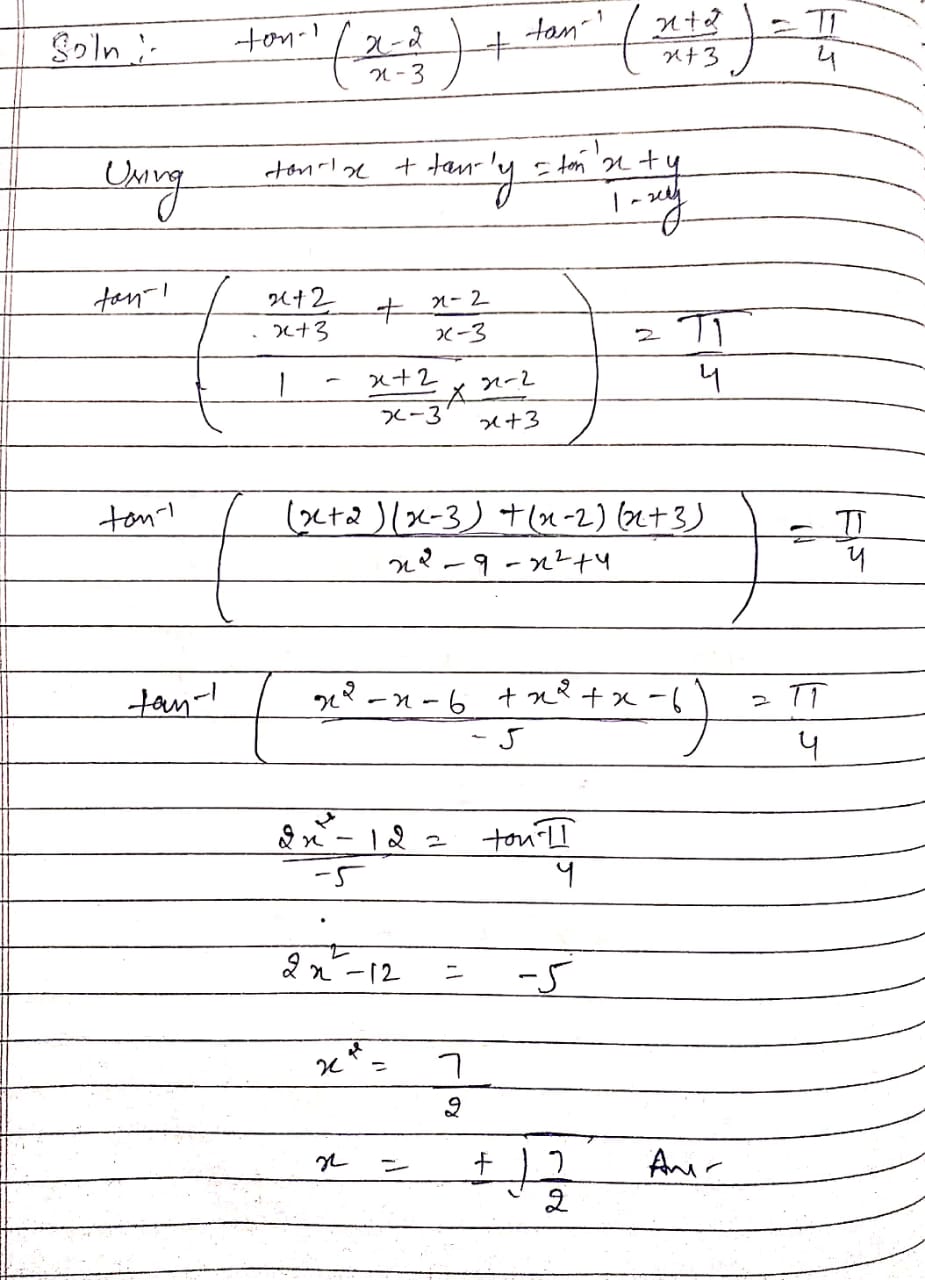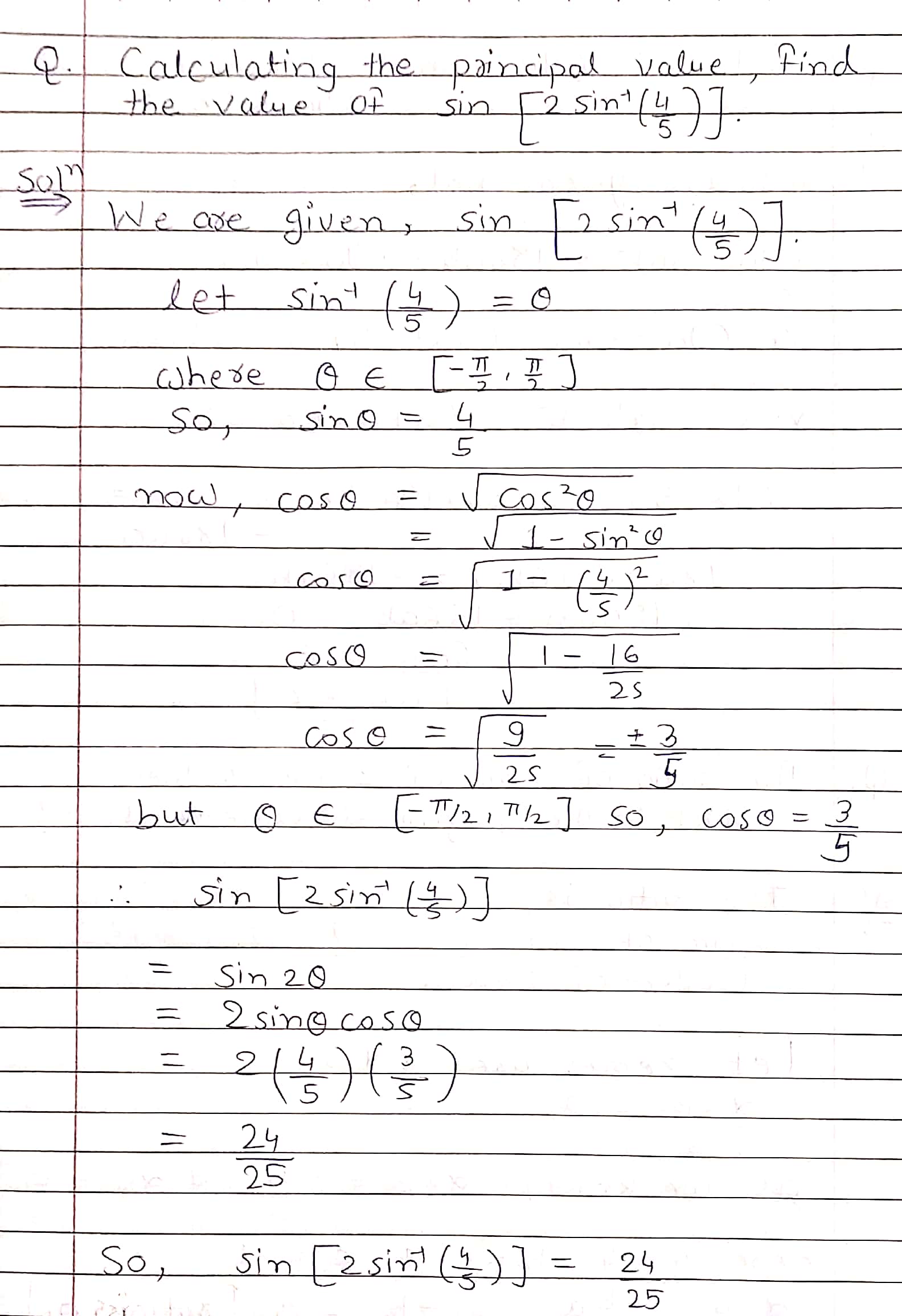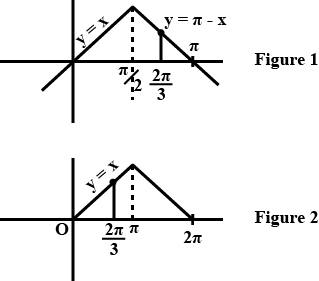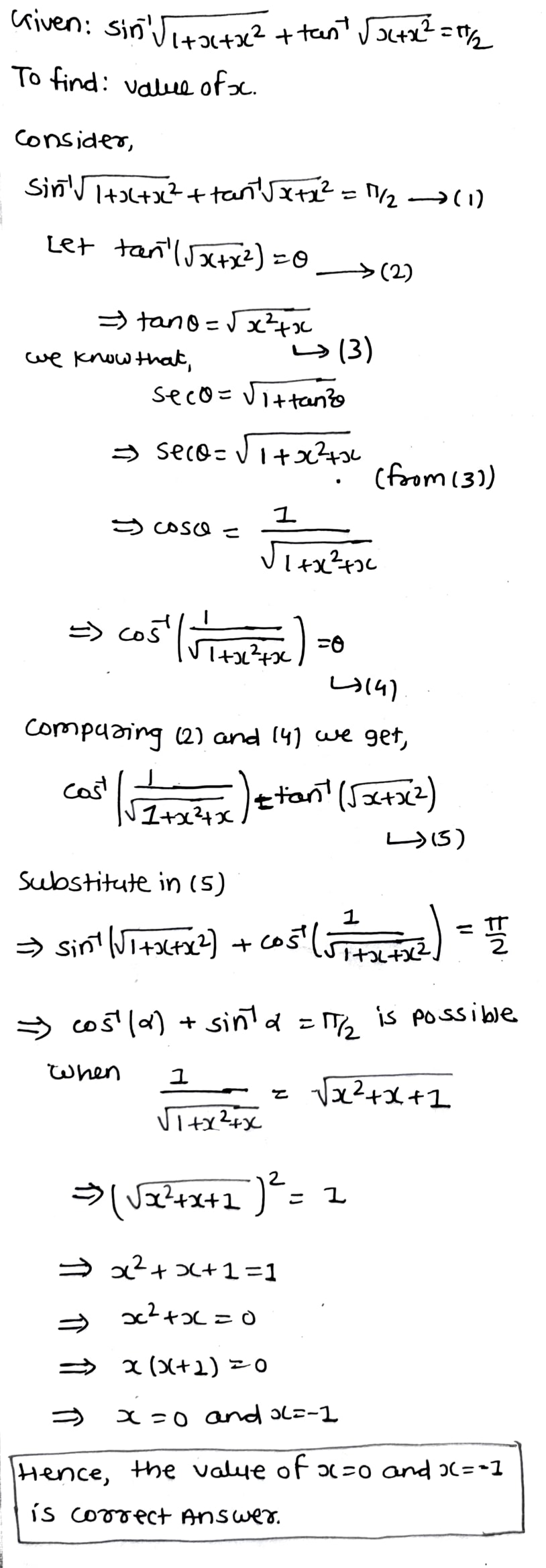Inverse Trigonometric Functions - Class 12 Engineering Maths - Extra Questions
$$\sin^{-1} x + \cos^{-1} x =$$ ________
If $$xy < 1$$, $$\tan ^{ -1 }{ x } +\tan ^{ -1 }{ y } =$$ _______.
Prove that $$\tan ^{ -1 }{ (1) } +\tan ^{ -1 }{ (2) } +\tan ^{ -1 }{ (3) } =\pi $$
If $$f : \left(-\dfrac{\pi}{2}, \dfrac{\pi}{2}\right) \rightarrow (-\infty, \infty)$$ is defined by $$f(x) = \tan x$$, then $$f^{-1}( \sqrt{3}) =$$
If $${\sin ^{ - 1}}\sqrt {1 + x + {x^2}} + {\tan ^{ - 1}}\sqrt {x + {x^2}} = \dfrac{\pi }{2}$$
$$then\,x = $$
Simplify $$\sin (\sin^{-1}(\dfrac {1}{5})+\cos^{-1}(x))=1$$
Solve $$\sin^{-1}\sqrt {x}$$
If $$ \tan^{-1} \left (\dfrac{1}{2i^2}\right) = t $$, then $$\tan t$$ equals
Prove $$\tan^{-1} \dfrac{3}{4} + \tan^{-1} \dfrac{3}{5} - \tan^{-1} \dfrac{8}{19} = \dfrac{\pi}{4}$$.
Evaluate : $$\cos \left[ {{\cos }^{-1}}\left( -\dfrac{\sqrt{3}}{2} \right)+\dfrac{\pi
}{6} \right] $$
If $${\sin ^{ - 1}}x = \dfrac{\pi }{5}$$, for some $$x \in \left( { - 1,1} \right)$$, then find the value of $${\cos ^{ - 1}}x$$.
Solve $${\sin ^{ - 1}}\left( {\cos x} \right)$$
Evaluate: $$\tan^{-1}\sqrt{3}-\sec^{-1}(-2)+cosec^{-1}\dfrac{2}{\sqrt{3}}$$.
Prove that $$\displaystyle \sin \cot^{-1} \tan \cos^{-1} x = \sin cosec^{-1} \cot \tan^{-1} x = x$$ where $$\displaystyle x \: \epsilon \: \left ( 0, \: 1 \right ]$$
Write the function in the simplest form:
$$\displaystyle { \tan }^{ -1 }\frac { 1 }{ \sqrt { { x }^{ 2 }-1 } } ,\left| x \right| >1$$
Prove: $$\displaystyle 2{ \tan }^{ -1 }\frac { 1 }{ 2 } +{ \tan }^{ -1 }\frac { 1 }{ 7 } ={ \tan }^{ -1 }\frac { 31 }{ 17 } $$
Prove: $$\displaystyle { \tan }^{ -1 }\frac { 2 }{ 11 } +{ \tan }^{ -1 }\frac { 7 }{ 24 } ={ \tan }^{ -1 }\frac { 1 }{ 2 } $$
If $$\displaystyle { \tan }^{ -1 }\frac { x-1 }{ x-2 } +{ \tan }^{ -1 }\frac { x+1 }{ x+2 } =\frac {\pi }{ 4 } $$, then find the value of $$x$$.
If $$\displaystyle \sin { \left( { \sin }^{ -1 }\frac { 1 }{ 5 } +{ \cos }^{ -1 }x \right) } =1$$, then find the value of $$x$$.
Find the value of $$\displaystyle \tan { \frac { 1 }{ 2 } } \left[ { \sin }^{ -1 }\frac { 2x }{ 1+{ x }^{ 2 } } +{ \cos }^{ -1 }\frac { 1-{ y }^{ 2 } }{ 1+{ y }^{ 2 } } \right] ,\left| x \right| <1,y>0$$ and $$xy<1$$
Prove: $$\displaystyle \frac { 9\pi }{ 8 } -\frac { 9 }{ 4 } { \sin }^{ -1 }\frac { 1 }{ 3 }=\frac { 9 }{ 4 } { \sin }^{ -1 }\frac { 2\sqrt { 2 } }{ 3 } $$
If $$A=\dfrac{1}{1}\cot^{-1}\left(\dfrac{1}{1}\right)+\dfrac{1}{2}\cot^{-1}\left(\dfrac{1}{2}\right)+\dfrac{1}{3}\cot^{-1}\left(\dfrac{1}{3}\right)$$ and $$B=1\cot^{-1}1+2\cot^{-1}2+3\cot^{-1}3$$ then $$|B-A|$$ is equal to $$\dfrac{a\pi}{b}+\dfrac{c}{d}\cot^{-1}3$$ where $$a, b, c, d \in N$$ and are in their lowest form then $$a + b + c+d$$ equal to
Solve the equation: $$\tan^{-1}x+2\cot^{-1}x=\displaystyle\frac{2\pi}{3}$$.
Write the simplest form of $$\tan^{-1}\left (\dfrac {\cos x - \sin x}{\cos x + \sin x}\right ), 0 < x < \dfrac {\pi}{2}$$.
Write $$\tan ^{ -1 }{ \left[ \cfrac { \sqrt { 1+{ x }^{ 2 } } -1 }{ x } \right] } ,x\neq 0$$ in the simplest form.
If $$\sin \left (\sin^{-1} \dfrac {1}{5} + \cos^{-1} x\right ) = 1$$ then find the value of $$x$$.
Inverse circular functions,Principal values of $${ sin }^{ -1 }x,{ cos }^{ -1 }x,{ tan }^{ -1 }x$$.
$${ tan }^{ -1 }x+{ tan }^{ -1 }y={ tan }^{ -1 }\frac { x+y }{ 1-xy } $$, $$xy<1$$
$$\pi +{ tan }^{ -1 }\frac { x+y }{ 1-xy } $$, $$xy>1$$.
(a) $${ cos }^{ -1 }\left( cos\frac { 7\pi }{ 6 } \right) $$
(b) $${ cos }^{ -1 }\left( cos\frac { 4\pi }{ 3 } \right) $$
Inverse circular functions,Principal values of $${ sin }^{ -1 }x,{ cos }^{ -1 }x,{ tan }^{ -1 }x$$.
$${ tan }^{ -1 }x+{ tan }^{ -1 }y={ tan }^{ -1 }\frac { x+y }{ 1-xy } $$, $$xy<1$$
$$\pi +{ tan }^{ -1 }\frac { x+y }{ 1-xy } $$, $$xy>1$$.
(a) $${ tan }^{ -1 }\frac { 2mn }{ { m }^{ 2 }-{ n }^{ 2 } } +{ tan }^{ -1 }\frac { 2pq }{ { p }^{ 2 }-{ q }^{ 2 } } ={ tan }^{ -1 }\frac { 2MN }{ { M }^{ 2 }-{ N }^{ 2 } } $$
where $$M=mp-nq,N=np+mq$$
(b) $$\frac { 2 }{ 3 } { tan }^{ -1 }\frac { 3m{ n }^{ 2 }-{ m }^{ 3 } }{ { n }^{ 3 }-3{ m }^{ 2 }n } +\frac { 2 }{ 3 } { tan }^{ -1 }\frac { 3p{ q }^{ 2 }-{ p }^{ 3 } }{ { q }^{ 3 }-3{ p }^{ 2 }q } ={ tan }^{ -1 }\frac { 2MN }{ { M }^{ 2 }-{ N }^{ 2 } } $$
Where $$M=-mp+nq,N=np+mq$$ and all the letters are $$+ive$$ quantities.
Solve the equation $$ \tan^{-1} \sqrt{x^2+x}+\sin^{-1} \sqrt{x^2+x+1}=\dfrac{\pi}{2}$$
If $$ \cot^{-1} \left( \frac{\sqrt{1+ \sin x}+ \sqrt{ 1- \sin x}}{\sqrt{1+\sin x}-\sqrt{1- \sin x}}\right) =\dfrac{x}{m}, x \in \left(0, \frac{\pi}{4}\right)$$.Find $$m$$
If $$(Tan^{-1}x)^2+(Cot^{-1}x)^2=\dfrac{5\pi^2}{8},then$$ x=
find the value of the following:
$$(i) \ \sin^{-1}(\frac{-1}{2})$$
$$(ii) \ \cos^{-1}(\frac{\sqrt{3}}{2})$$
$$(iii) \ \text{cosec}^{-1}(2)$$
$$(iv) \ \tan^{-1} ({-\sqrt{3}})$$
$$(v) \ \cos^{-1}(\frac{-1}{2})$$
$$(vi) \tan^{-1} (-1)$$
Differentiate $$\cos^{-1}(4x^{2} -3x); x \epsilon (\frac{1}{2}, 1)$$
Solve the following for $$x:\tan^{-1}\left(\dfrac{x-2}{x-3}\right)+\tan^{-1}\left(\dfrac{x+2}{x+3}\right)=\dfrac{\pi}{4},|x|<1$$
Simplify : $$\cot^{-1} [\sqrt{1 + x^2} - x]$$
Does $$\sin^{-1} \left(\dfrac{2}{\sqrt{5}} \right) = \tan^{-1} (2)$$ & please give value.
Find the domain and range of the real function $$\cfrac { x+2 }{ { x }^{ 2 }-8x-4 } $$
Solve $$y=\tan ^{ -1 }{ \cfrac { 5ax }{ a^{ 2 }-6{ x }^{ 2 } } } $$, find $$\cfrac { dy }{ dx } $$
Calculating the principal value, find the value of $$\sin\left[2\sin^{-1}\left(\dfrac{4}{5}\right)\right]$$.
Find $$\sin ^{ -1 }{ \left( \cfrac { \sqrt { 3 } +1 }{ 2\sqrt { 2 } } \right) } $$=
Prove that $${\sin ^{ - 1}}\dfrac{3}{5} - {\sin ^{ - 1}}\dfrac{8}{{17}} = {\cos ^{ - 1}}\left( {\dfrac{{84}}{{85}}} \right)$$
$$2{\tan ^{ - 1}}\left( {\frac{{1 + x}}{{1 - x}}} \right) + {\sin ^{ - 1}}\left( {\frac{{1 - {x^2}}}{{1 + {x^2}}}} \right) = $$
Prove
$$4\tan^{-1}\left(\dfrac{1}{5}\right)-\tan^{-1}\left(\dfrac{1}{70}\right)+\tan^{-1}\left(\dfrac{1}{99}\right)=\dfrac{\pi}{4}$$.
Find the value of $$\sin\left(\dfrac{1}{2}\cot^{-1}\left(-\dfrac{3}{4}\right)\right)$$.
if$$\int \sin^{-1}\left ( \dfrac{2x+2}{\sqrt{4x^2+8x+13}} \right )dx$$$$=(x + 1)tan^{-1}\left ( \dfrac{2x+2}{3}\right )$$+$$\lambda$$$$ln(4x^2+8x+13)$$+$$C$$
then find the value of - 4$$\lambda$$
If $$0< \cos^{-1} x< 1$$ and $$1+\sin (\cos^{-1}x)+\sin^{2}(\cos^{-1}x)+\sin^{3} (\cos^{-1}x)+.........\infty =2,$$ then find $$2\sqrt{3}x.$$
Find the number of values of $$x$$ of the form $$6n$$, where $$n$$ is an integer , in the domain of the function $$f(x)=x\ln|x-1|+\displaystyle \frac{\sqrt{64-x^{2}}}{\sin x}$$
If $$ \displaystyle 0< \cos ^{-1}x< 1 $$ and $$ \displaystyle 1+\sin(\cos^{-1}x)+\sin^{2}(\cos^{-1}x)+\sin^{3}(\cos^{-1}x)+...infinity= 2$$ then the value of $$ \displaystyle 12 x^{2}$$ is
If the domain of the function $$\displaystyle f(x)= \sqrt{3\cos^{-1}(4x)-\pi} $$ is [a,b] then the value of $$ \displaystyle (4a+64b)$$ is
If $$\displaystyle x= \sin^{-1}(a^{6}+1)\cos^{-1}(a^{4}+1)-\tan^{-1}(a^{2}+1),a\epsilon R$$ , then the value of $$\displaystyle \sec^{2}x$$ is
If range of the function $$ \displaystyle f(x)= \sin^{-1}x+2\tan^{-1}x+x^{2}+4x+1$$ is $$[p,q]$$, then the value of $$(p+q)$$ is
Prove that
$$2\tan^{-1} \dfrac {1}{2} + \tan^{-1}\dfrac {1}{7} = \tan^{-1} \dfrac {31}{17}$$
Prove that $$\tan^{-1} \left [\dfrac {\sqrt {1 + x} + \sqrt {1 - x}}{\sqrt {1 + x} - \sqrt {1 - x}}\right ] = \dfrac {\pi}{4} + \dfrac {1}{2} \cos^{-1} x, 0 < x < 1$$
The number of real solutions of the equation
$$\sin^{-1}\left(\displaystyle\sum^{\infty}_{i=1}x^{i+1}-x\displaystyle\sum^{\infty}_{i=1}\left(\displaystyle\dfrac{x}{2}\right)^i\right)=\dfrac{\pi}{2}-\cos^{-1}\left(\displaystyle\sum^{\infty}_{i=1}\left(-\displaystyle\frac{x}{2}\right)^i-\displaystyle\sum^{\infty}_{i=1}(-x)^i\right)$$ lying in the interval $$\left(-\displaystyle\frac{1}{2}, \frac{1}{2}\right)$$ is
Using principal values, evaluate the following
$$\cos^{-1}(\cos\dfrac{2\pi}{3})$$+ $$\sin^{-1}(\sin\dfrac{2\pi}{3})$$
$$\dfrac{d}{dx}\sin ^{-1}\left(2x\sqrt{1-x^2}\right)=.......|x|>\dfrac{1}{\sqrt{2}}$$
Find the value of $$\sin (\cfrac{1}{4}\sin^{-1}\cfrac{\sqrt 63}{8})$$
Prove that $$\tan^{-1}\dfrac{1}{7}+\tan^{-1}\dfrac{1}{13}-\tan^{-1}\dfrac{2}{9}=0$$
$${\sin ^{ - 1}}\sqrt {1 + x + {x^2}} + {\tan ^{ - 1}}\sqrt {x + {x^2}} = \frac{\pi }{2}$$
$$then\,x = $$
$$\tan^{-1}\left(\dfrac{5-x}{6x^2-5x-3}\right)$$.
$$\cot^{-1} \dfrac {1 - x}{1 + x}$$.
$$\tan^{-1}\left(\dfrac{4x}{1+5x^2}\right)+\tan^{-1}\left(\dfrac{2+3x}{3-2x}\right)$$.
Find the value of $$\sin{\left[\dfrac{1}{2}\cot^{-1}{\left(\dfrac{-3}{4}\right)}\right]}$$.
Class 12 Engineering Maths Extra Questions
- Continuity And Differentiability Extra Questions
- Determinants Extra Questions
- Differential Equations Extra Questions
- Integrals Extra Questions
- Inverse Trigonometric Functions Extra Questions
- Relations And Functions Extra Questions
- Three Dimensional Geometry Extra Questions
- Vector Algebra Extra Questions



